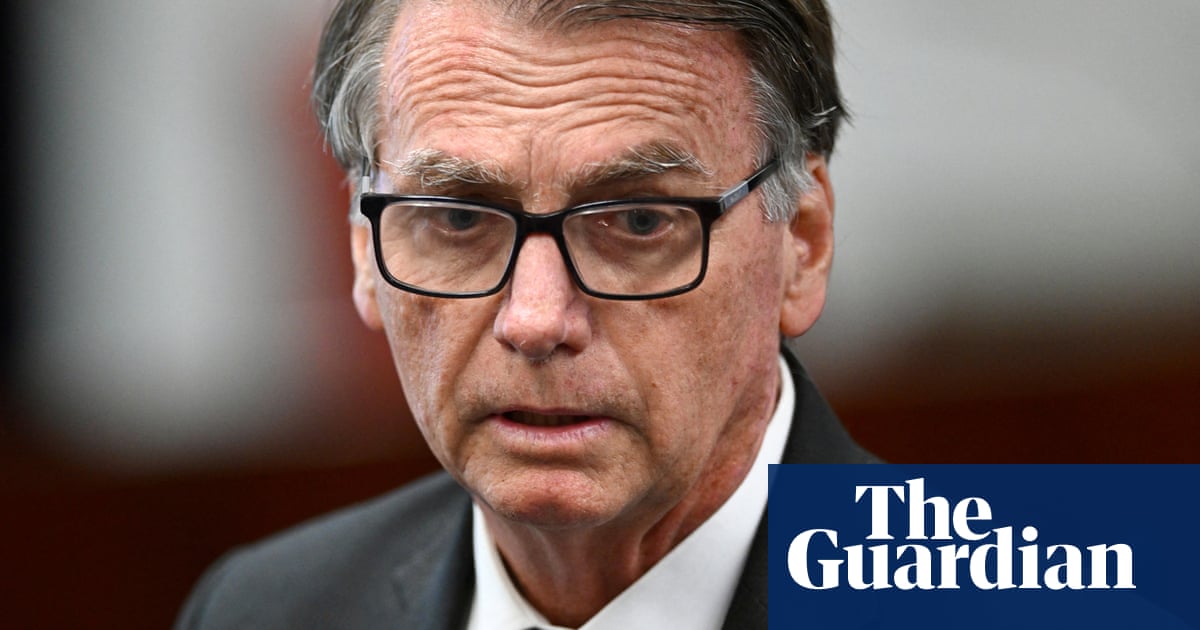Brazil’s former president Jair Bolsonaro has denied masterminding a far-right coup plot athis trial in the supreme court, but he admitted to taking part in meetings to discuss “alternative ways” of staying in power after his defeat in the 2022 election.
In just over two hours of questioning, the 70-year-old said that after the electoral court confirmed Luiz Inácio Lula da Silva’s election victory, “we studied other alternatives within the constitution.”
Those options included the deployment of military forces and suspension of some civil liberties, Bolsonaro said, but he argued that such discussions could not be considered an attempted coup.
“A coup is something abominable. A coup may even be easy to start. The day after is simply unpredictable and harmful to everyone.Brazilcould not go through something like that, and such a hypothesis was never even considered during my government,” he said.
Bolsonaro confirmed his allies had considered various options, including the declaration of a state of siege, but did not pursue them because “there was no climate for it, no opportunity; we didn’t even have a minimally solid base to do anything.”
The former chiefs of the air force and the army had previously told police that theyopposed Bolsonaro’s plans during those meetings, although they said the former navy commander pledged to back the rightwing autocrat.
With a hoarse voice, the far-right leader used the live broadcast of his questioning to turn much of the hearing into a political platform, defending his 2019-2023 administration and repeatedly criticising Lula’s third term.
There had been some expectation over his face-off with the case’s lead judge, justice Alexandre de Moraes – the former head of the electoral court, whom Bolsonaro has previously called a “jerk” and a “scoundrel”.
But Bolsonaro apologised to Moraes and two other justices for saying in a meeting – a recording of which was submitted as evidence – that they had allegedly received between $30m and $50m each to rig the election.
“It was a vent, rhetoric I used,” he said. “So, I apologise. I had no intention of accusing you of any misconduct”.
Though he is barred from running for office by an electoral court ruling in a separate case – for spreading lies and attacking the voting system – Bolsonaro joked with Moraes, saying: “I’d like to invite you to be my running mate in 2026.”
Smiling, the justice replied: “I’ll pass.”
Bolsonaro was the sixth defendant to be questioned since the trial began on Monday of the eight men considered the“nucleus” of the attempted coup. The accused include four former Bolsonaro ministers – three of them army generals; the ex-commander of the navy; and the ex-president’s former right-hand man, Lt Col Mauro Cid.
It is the first time that high-ranking military officers have ever faced trial over an attempted coup d’état in Brazil, a country that endured a bloody dictatorship from 1964 to 1985.
Journalist and political analyst Miriam Leitãowrote in her column in O Globothat “what was most striking … was the casual atmosphere in which a coup d’état was discussed within the Bolsonaro government.
“Everyone knew about it – there were several conversations, meetings in function rooms, inside the presidential palace and at the top of the military hierarchy,” she wrote.
The first to testify was Bolsonaro’s former aide-de-camp, Lt Col Mauro Cid, who signed a plea bargain and whose testimony, alongside evidence gathered by the federal police, forms the basis for the prosecution’s case.
He reaffirmed that Bolsonaro edited a draft decree that provided for the arrest of several authorities, including members of Congress and supreme court justices, and the creation of a commission to organise new elections.
“He [Bolsonaro] shortened the document, removing the authorities’ arrests. Only you would be imprisoned,” Lt Col Cid told Moraes.
He also said that his former boss attempted unsuccessfully to find some kind of “fraud” in the electronic voting system, hoping to “convince the armed forces to do something”.
Once the defendants’ testimony concludes, the prosecution and defence will have five days to request further inquiries to gather new evidence, which the rapporteur, Moraes, may accept or reject. After that come the final arguments and, ultimately, the trial verdict, which is expected in the second half of the year.
